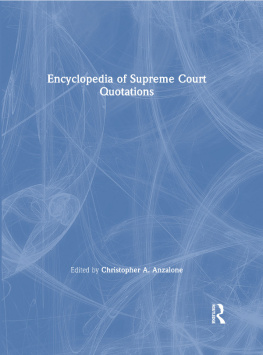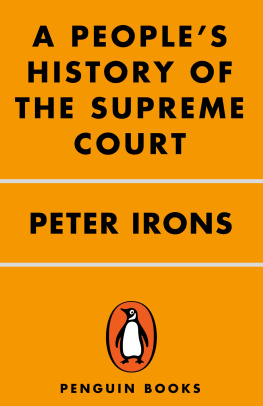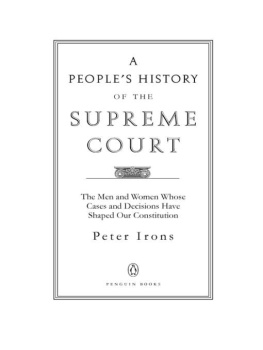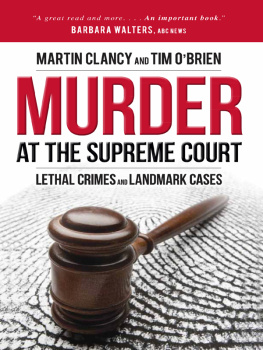SUPREME COURT CASES ON POLITICAL REPRESENTATION 1787-2001
SUPREME COURT CASES ON POLITICAL REPRESENTATION 1787-2001
CHRISTOPHER A. ANZALONE
EDITOR
First published 2002 by M.E. Sharpe
Published 2015 by Routledge
2 Park Square, Milton Park, Abingdon, Oxon OX14 4RN
711 Third Avenue, New York, NY 10017, USA
Routledge is an imprint of the Taylor & Francis Group, an informa business
Copyright 2002 Taylor & Francis. All rights reserved.
No part of this book may be reprinted or reproduced or utilised in any form or by any electronic, mechanical, or other means, now known or hereafter invented, including photocopying and recording, or in any information storage or retrieval system, without permission in writing from the publishers.
Notices
No responsibility is assumed by the publisher for any injury and/or damage to persons or property as a matter of products liability, negligence or otherwise, or from any use of operation of any methods, products, instructions or ideas contained in the material herein.
Practitioners and researchers must always rely on their own experience and knowledge in evaluating and using any information, methods, compounds, or experiments described herein. In using such information or methods they should be mindful of their own safety and the safety of others, including parties for whom they have a professional responsibility.
Product or corporate names may be trademarks or registered trademarks, and are used only for identification and explanation without intent to infringe.
Library of Congress Cataloging-in-Publication Data
Supreme Court cases on political representation, 17872001 / Christopher A. Anzalone, editor
p. cm.
Includes bibliographical references and index.
ISBN 0-7656-0710-7 (hardcover : alk paper)
1. Election lawUnited StatesDigests. 2. Representative government and representationUnited StatesDigests. 3. Proportional representationUnited StatesHistory. I. Anzalone, Christopher A., 1963
KF4885.A75 S87 2002
342.73053dc21
2001031154
ISBN 13: 9780765607102 (hbk)
To Michael, Toni, Kathryn, and Damien
Contents
It is certain in Theory, that the only moral Founation of Government is the consent of the People. But to what an Extent Shall We carry this Principle?
John Adams (1776)
If the notion that political rights are relegated to some arcane domain of the legal specialist, that they fail to merit the attention or passions of the American public, that all the major issues have been resolved, and all that remain are the minute tinkering of details, then how does one explain the compelling drama leading to Bush v. Gore () decided by the U.S. Supreme Court in December 2000? Charges and counter-charges of voting irregularities, stolen elections, and partisan courts were rampant. Meanwhile, a myriad of issues during this millennial period indicate that the quest for political rights is alive and well and worthy of more than just prosaic attention and debate. Term limits, referenda and initiatives, instructions to legislators, accuracy of the census, legislative redistricting, and campaign finance reform are, and will continue to be, front-burner issues with Americans. And as Alexis de Tocqueville reminds us, most controversies in the United States ultimately find some sort of resolution in court.
Political rights are about fairness in voting; the right to vote; the right to seek office; the access to the tools to exercise while seeking office; qualifications for political office; the right to speech, press, and association related to the political process; protections for those testifying in front of congressional committees, and the like. When one considers whether Americans have political rights, it is not really about how the constitution addresses political rights nor is it what laws were crafted to address political rights; rather it is how the laws are played out daily, one case at a time.
Between the covers of this one volume there are over 400 Supreme Court cases, the first one, Anderson v. Dunn (), was decided in 1821; the last, in 2001. Although the Supreme Court is obviously a creation of the U.S. Constitution, which was drafted in 1787, the Court did not decide its first political rights case until 1821. Since there were no earlier cases, this book is, in fact, the complete history of the Supreme Court for political rights and representation.
The cases have been editedoften substantiallyto keep the focus on political rights. Only the opinions for the Court are included. This is in recognition of the indisputable impact the majority opinion has on governing; concurring and dissenting opinions have inherent value in legal discourse, but by definition they offer only alternatives.
As mentioned above, this book includes several hundred cases, some of which are landmark events in American constitutional and political history; others are far less newsworthy. But in the aggregate, these cases demonstrate a more thoughtful and steady (and at times glacial) approach to judicial decision-making and constitutional interpretation. It is the reality of the Court.
This book is divided into sixteen chapters. includes the Supreme Court decisions that do not neatly fit into the other chapters; for example, there are political rights decisions within the criminal justice, patronage, and judicial orders to a legislative branch.
Lastly, the bibliography points readers to useful scholarly resources to facilitate additional research, and the table of cases and index allow quick referencing within the book.
I would like to thank my invaluable team at M.E. Sharpe: Peter Labella, Esther Clark, and Henrietta Toth. I share with them all the great things about this book. I would also like to recognize the excellent resources at the law libraries at Washington College of Law (American University) and Albany Law School.
SUPREME COURT CASES ON POLITICAL REPRESENTATION 1787-2001
This chapter looks at suffrage for minorities and women, laws against obstruction of voting or voting fraudulently, registration and qualifications of voters, and the Courts decisions on various provisions of the Voting Rights Act of 1965.
Minor v. Happerset
88 U.S. 162 (1874)
The question is whether, since the adoption of the Fourteenth Amendment, a woman, who is a citizen of the United States and of the State of Missouri, is a voter in that State, notwithstanding the provision of the constitution and laws of the State, which confine the right of suffrage to men alone.
There is no doubt that women may be citizens. They are persons, and by the Fourteenth Amendment all persons born or naturalized in the United States and subject to the jurisdiction thereof are expressly declared to be citizens of the United States and of the State wherein they reside. But, in our opinion, it did not need this amendment to give them that position.
Other proof of like character might be found, but certainly more cannot be necessary to establish the fact that sex has never been made one of the elements of citizenship in the United States. In this respect men have never had an advantage over women. The same laws precisely apply to both. The Fourteenth Amendment did not affect the citizenship of women any more than it did of men. In this particular, therefore, the rights of Mrs. Minor do not depend upon the amendment. She has always been a citizen from her birth, and entitled to all the privileges and immunities of citizenship. The amendment prohibited the State, of which she is a citizen, from abridging any of her privileges and immunities as a citizen of the United States; but it did not confer citizenship on her. That she had before its adoption.







